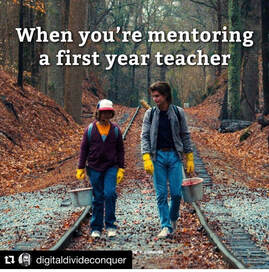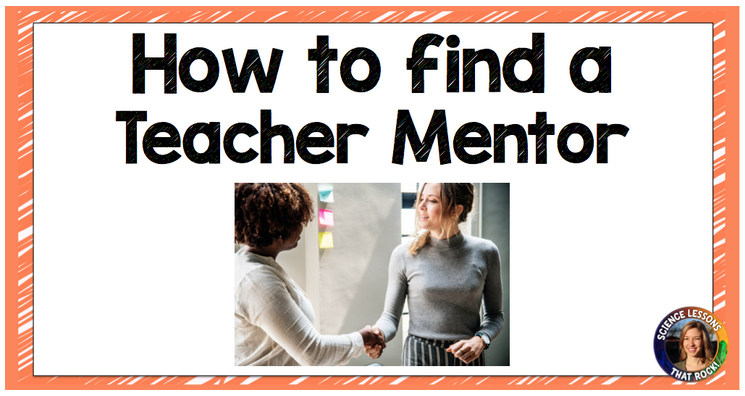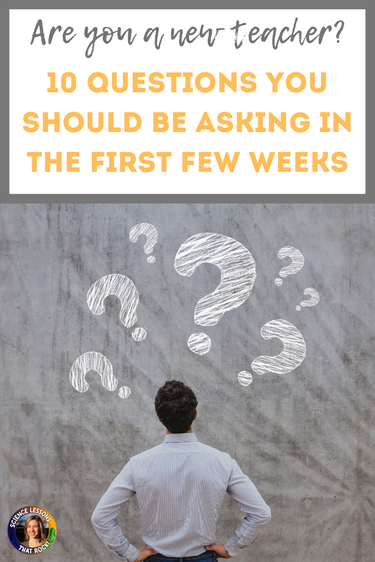 Meme from @DigitalDivideConquer
Meme from @DigitalDivideConquer
But as I look back on the past 12 years I know for a fact I wouldn’t have made it through all those tough times without some amazing colleagues and mentors. There were days during my first year I would go home and cry and think “I just can’t do this.” And even when I switched schools and had 5 years of experience under my belt I felt all of those feelings again. If your significant other isn’t a teacher, you can vent all you want and they can try and be empathetic but they just won’t get it. You need to find a mentor to help you maintain your sanity. Someone asked me once on my instagram to do a blog post about finding a teacher mentor and I feel like back to school season is the perfect time to discuss. So here we go!
HOW TO FIND A TEACHER MENTOR:
1. If you are a new teacher, this could be (and should be) something you ask during the interview process. Does the school provide you with a mentor teacher? Will you have a structured grade-level support team? What resources will they provide you as a new teacher? I promise you won’t sound needy, you will sound like you want to be prepared.
2. Many districts have a science content specialist. They get paid to help you teach science well, so utilize them! My district also has something called a “professional development specialist” who runs monthly PD sessions for new teachers and sits in on lessons once a quarter. Don’t be afraid to send emails, ask them to come sit in on a lesson or two, or offer guidance on how to better introduce a new topic.
3. If your school doesn’t have a specified person to help new teachers, go ask an administrator for some recommendations. Have something in mind you want to improve- maybe classroom management. Go ask your administrator which teachers on your campus have exceptional classroom management and then give up your prep one day (I know…. but it will be worth it, I promise) to go watch them teach. If you are afraid to approach them yourself, see if your administrator will send your colleague an email asking for permission for you to come observe, and have them cc you on the email. Even as a veteran teacher, I still have things I can improve and I benefit greatly from watching others teach.
4. Utilize your grade level or department team. Hopefully your school sets aside some time during the week for you to meet with your grade level team or department. Observe who has a personality similar to you that you know you would get along with and make an effort to get to know them. During your meetings, don’t be afraid to ask questions on how they teach a concept, how they manage the student that ALWAYS needs to go to the bathroom, or how they stay on top of grading. Not every suggestion will work for you, but it’s good to get different ideas and perspectives.
I know the first year of teaching I had people always checking in on me asking “do you need help or have any questions?” My response was typically “I’m sure I’ll have questions… but I don’t even know what to ask yet.” It’s overwhelming. So here are some tips on things you should ask for help on in the first few weeks or months of school:
1. Ask about how to handle crisis situations. This includes fire drills, lock downs, or even a kid going crazy in your class. Who are you supposed to call?
2. Ask for classroom management tips. This could include: how to handle bathroom breaks, kids that constantly blurt out answers, the kid who can’t sit still, or the student who can’t stay awake no matter how engaging your lesson is. Veteran teachers have dealt with all of these situations and can likely give you some helpful tips.
3. Dress code. Does your school have a student dress code that you need to enforce? What should you do if students are breaking dress code? Is there a teacher dress code you should know about? At my first school I got hired mid-year so I missed all of the beginning of the year meetings. One Friday I wore flip flops to school (I know, not the most professional decision I ever made) but got in trouble for breaking the teacher dress code…. which I had no idea about. Ask!
4. Timing and pacing of lessons is hard. Ask what other colleagues do if class finishes a few minutes early. Do they allow free time? Do they have any fun activities or ideas to share? (Here is an idea of what I do if class finishes a few minutes early).
5. Ask them to help you set up your gradebook. How often do they put in grades? What categories do they use? Is there a standard school policy? Do you have to turn in progress reports?
6. The first time you need to call a parent for a behavior issue can be scary. Ask them to sit with you the first time you call home and give you some pointers. (Tip: don’t just call home for your problem students, call home when kids do something stellar too! It will make their day).
7. At my first school we had something called “think time” which is essentially “time out” time. This is for the student that didn’t do anything bad enough to warrant calling the office or a referral, but is driving you crazy and knows exactly how to push your buttons. Sometimes having a 5 minute break from that student is enough for you to regain your composure and focus on the other students. Ask a neighboring teacher if they have a spare desk in their classroom you could use as a “think time” desk. If a kid was driving me nuts, I’d send them over with a form to fill out that had them answer a few questions reflecting on their behavior. Once they felt ready to come back and re-join the lesson, they would. (Tip: try and find a teacher of a different grade level to be your think time buddy. If the other class is the same grade level, your think time student will probably have friends in there and become a distraction).
8. Ask your mentor teacher to come watch you practice a lesson before your observation. They can give you feedback and tips to score well on the evaluation rubric.
9. Ask for lesson and lab ideas. If you are teaching a concept you aren’t completely familiar with, ask someone in your content area how they approach it or what labs they use to supplement the lesson.
10. There will be a time when you wake up with a fever and think “OMG I don’t have sub plans ready, I’ll have to go in with this 104 degree fever!” Have an emergency sub plan ready and on your desk in case this happens. Ask about the process for calling a substitute teacher. How many sick days do you have? Do they roll over to the next school year if you don’t use them? Are there rules about how many sick days you can take in a row without providing a doctors note?
While the first year is tough, I promise it gets easier- especially when you have supportive people beside you. If you have any questions or need some more specific tips, leave them in the comments!
(If you are a new teacher and want to see my top 10 tips for the first year, you can read them here!)









